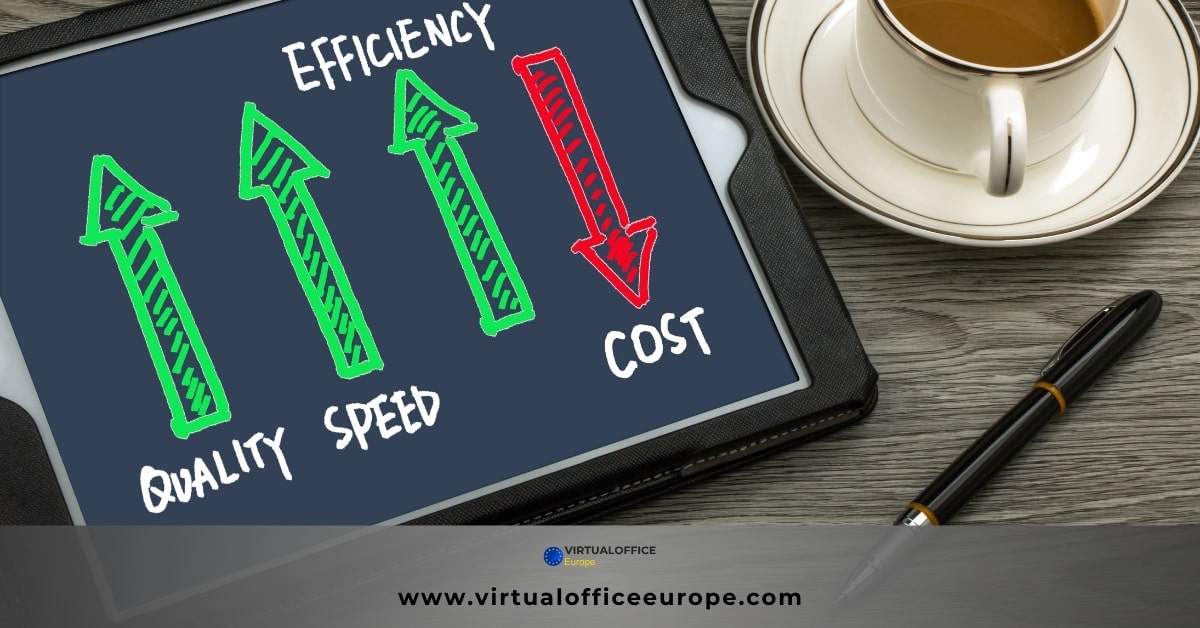Virtual offices have rapidly become an attractive solution for businesses looking to maintain a professional presence without the significant costs associated with a physical location. 📈 Across Europe, this concept has gained momentum, offering flexibility and cost-efficiency for businesses of all sizes. However, navigating the complex legal landscape is crucial to ensuring compliance and mitigating potential risks.
Understanding the Concept of Virtual Offices
Defining a Virtual Office
A virtual office provides businesses with various services that allow them to operate remotely while maintaining a polished image. These services typically include a business address, mail handling, telephone answering services, and access to meeting rooms—all without the need for a physical workspace.
Core Services Offered by Virtual Offices
- Business Address: A prestigious address in a prime location can significantly enhance a company’s reputation.
- Mail Handling: Incoming correspondence is received and forwarded to the business owner.
- Telephone Answering: Professional receptionists handle calls on behalf of the business.
- Meeting Rooms: Access to physical spaces for meetings as needed.
Differences Between Traditional and Virtual Offices
Traditional offices require a physical space for daily operations, whereas virtual offices offer the flexibility to work from anywhere. This model drastically reduces overhead costs while still providing essential services crucial for business operations.
The Legal Framework Governing Virtual Offices in Europe
Overview of European Business Regulations
Europe’s legal framework is intricate, with each country having its own set of regulations. Businesses operating virtual offices must be aware of both local and international laws that may impact their operations.
Country-Specific Regulations for Virtual Offices
Each European country has unique requirements for virtual offices. Some may require a physical presence for certain types of businesses, while others are more lenient. Understanding these nuances is essential for ensuring compliance.
The European Union’s Role in Regulatory Standardization
The European Union (EU) plays a key role in harmonizing business regulations across member states. However, national laws still vary, making it crucial for businesses to navigate these differences to avoid legal complications. The EU’s efforts to standardize regulations help facilitate cross-border operations, but adhering to specific national requirements when setting up virtual offices is still essential.
Setting Up a Virtual Office: Legal Requirements
Legal Formalities for Establishing Virtual Offices
Setting up a virtual office in Europe involves several legal formalities, such as registering the business with local authorities, obtaining necessary permits, and ensuring the business address is legally recognized. Depending on the country, businesses may need to provide proof of a physical address, even when operating virtually.
The Importance of a Registered Business Address
A registered business address is crucial for both legal and operational purposes. It serves as the official location for receiving legal notices and tax communications. Failure to have a valid business address can lead to serious legal consequences, such as fines or penalties.
Compliance with Local Business Laws
Each country enforces specific laws regarding business operations, which apply to virtual offices as well. Compliance with these laws is mandatory, and businesses must ensure they meet all local legal requirements, from business registration to tax obligations. Non-compliance can result in severe penalties, including the revocation of business licenses.
The Tax Implications of Virtual Offices
Overview of European Taxation Rules
Taxation is a complex issue when it comes to virtual offices. Each European country has its own tax system, and businesses must navigate these to stay compliant. The tax implications of operating a virtual office depend on factors such as the country of registration, the nature of the business, and where business activities take place.
How Virtual Offices Affect Tax Residency
A key consideration for businesses using virtual offices is tax residency. The location of your business’s registered address can determine where it is considered a tax resident, significantly impacting corporate tax rates, VAT obligations, and overall tax liability. In some cases, businesses may benefit from more favorable tax rates, while in others, they could face the risk of double taxation if not carefully managed.
Strategies for Optimizing Tax Liabilities
To optimize tax liabilities, businesses should consider consulting with tax experts knowledgeable in both local and international tax laws. Strategies might include choosing a country with favorable tax laws for registration, structuring the business to minimize tax exposure, and taking advantage of available tax treaties or incentives.
Data Protection and Privacy Challenges
The GDPR’s Impact on Virtual Offices
The General Data Protection Regulation (GDPR) is a critical law for businesses operating in Europe, and it applies to virtual offices just as much as traditional ones. The GDPR governs how businesses collect, store, and process personal data, and non-compliance can result in hefty fines. Businesses using virtual offices must ensure their data practices are GDPR-compliant, especially when handling sensitive customer information.
Ensuring Data Security in a Virtual Environment
Data security is vital in a virtual office setup. Since employees and business owners may access data from various locations, often on personal devices, the risk of data breaches increases. Implementing robust security measures, such as encryption, secure VPNs, and regular security audits, is essential for protecting business data.
Best Practices for Data Protection Compliance
To ensure compliance with data protection laws, businesses should:
- Conduct regular Data Protection Impact Assessments (DPIAs).
- Train employees on GDPR compliance and data security best practices.
- Ensure that all data storage solutions are secure and GDPR-compliant.
- Maintain a transparent privacy policy and inform customers of their data rights.
Employment Law and Virtual Offices
The Legal Status of Remote Workers in Europe
When managing a virtual office, businesses often employ remote workers who may be located in different countries. Understanding the legal status of these workers is essential, as employment laws vary significantly across Europe. This includes understanding workers’ rights, such as working hours, minimum wage laws, and entitlement to paid leave.
Drafting Employment Contracts for Virtual Work
Employment contracts for remote workers must be carefully drafted to reflect the nature of virtual work. Contracts should outline working hours, duties, and expectations while ensuring compliance with local employment laws. Businesses must also consider the legal implications of cross-border employment, such as the obligation to pay social security contributions in the employee’s country of residence.
Employer Responsibilities and Workers’ Rights
Even in a virtual office setup, employers are responsible for upholding workers’ rights. This includes ensuring a safe working environment, which may involve verifying that remote working conditions are adequate and that employees have access to necessary resources. Employers must also be aware of the legal requirements for terminating employment, which can vary by country.
The Role of Virtual Offices in Cross-Border Commerce
Facilitating International Business Expansion
Virtual offices play a crucial role in enabling businesses to operate across borders without needing a physical presence in multiple countries. This flexibility allows companies to enter new markets, manage international clients, and establish a global presence without incurring significant overhead costs.
Legal Considerations for Cross-Border Operations
When conducting cross-border business through a virtual office, businesses must navigate various legal complexities, such as differing commercial laws, import/export regulations, and contract enforcement across jurisdictions. Understanding these legal considerations is crucial to ensure that international transactions are legally binding and that the business is protected from potential disputes.
Success Stories of Cross-Border Virtual Office Setups
Several companies have successfully leveraged virtual offices to expand their operations internationally. For example, tech startups often use virtual offices to establish a presence in multiple countries, facilitating easier access to international markets and talent. These case studies highlight the potential benefits of virtual offices for businesses looking to grow globally while managing costs effectively.
Challenges in Navigating the Legal Landscape
Common Legal Challenges for Virtual Office Users
Operating a virtual office is not without its challenges. Common legal issues include failing to comply with local business regulations, misinterpreting tax obligations, and inadequate data protection. These challenges can lead to fines, legal disputes, and reputational damage.
Avoiding Legal Pitfalls Through Proactive Planning
Proactive planning is essential to avoid these pitfalls. This includes conducting thorough research on the legal requirements of the countries where the virtual office will operate, seeking professional legal and tax advice, and ensuring that all business practices align with local and international laws.
The Importance of Professional Legal Advice
Given the complexities of operating a virtual office in Europe, obtaining professional legal counsel is crucial. Lawyers with expertise in international business law can help navigate the complex legal landscape, ensuring the business remains compliant and protected from potential legal challenges.
The Future of Virtual Offices in Europe
Emerging Trends in Virtual Office Adoption
As technology continues to advance, the use of virtual offices is expected to grow. Emerging trends include the increasing adoption of virtual offices by small and medium-sized enterprises (SMEs), the integration of AI and automation into virtual office services, and the development of more advanced virtual meeting tools that bridge the gap between remote work and in-person collaboration.
Anticipated Changes in Legislation
As virtual offices become more common, there may be new legislation to address the unique challenges they present. This could include new regulations on remote work, data protection, and tax residency, making it even more important for businesses to stay informed about legal developments in this area.
The Role of Technology in Shaping the Future
Technology will continue to play a major role in the evolution of virtual offices. From cloud-based collaboration tools to advanced cybersecurity measures, technology will enable businesses to operate more efficiently and securely in a virtual environment, making the concept of a fully remote office increasingly viable.
Speaking Legal for Virtual Offices is Not So Hard
Navigating the legal landscape of virtual offices in Europe is complex but manageable. By understanding the legal requirements, tax implications, and data protection challenges, businesses can leverage the advantages of virtual offices while minimizing risks. As the trend towards virtual offices grows, staying informed and proactive will be key to success in this dynamic business environment.








